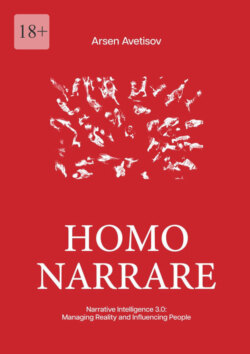Читать книгу Homo narrare. Narrative Intelligence 3.0: Managing Reality and Influencing People - Арсен Аветисов - Страница 14
PART ONE. NEUROPHYSIOLOGY
What Can Consciousness Really Do?
Why Is a Person Never to Blame?
ОглавлениеPeople will do anything, no matter how absurd, in order to avoid facing their own souls.
Carl Jung
The most critical function of human consciousness and intellect is adaptation – adjusting abilities to fit a current behavioral model that promotes survival. It is worth noting that consciousness performs this task exceptionally well. However, adapting to today’s «concrete jungle» is vastly different from how early humans adapted to the wild. Back then, adaptation primarily involved integrating into new food chains or adjusting to seasonal climate changes.
In modern times, adaptation is no longer passive mimicry or endless evolutionary refinement of organs and physiological processes. It is not about waiting for environmental changes and simply following along. Instead, effective adaptation today requires anticipating changes that do not yet exist and actively engaging with models of a predicted future.
Our consciousness constantly creates a representation of reality, modeling it and incorporating elements that do not actually exist in the real environment. The surrounding world is depicted in our consciousness as a network of interconnected narratives – stories that can be adjusted, restructured, explained, described, redefined, detailed, or entirely reimagined as virtual mental maps with their own navigation systems.
Using these mental maps, humans build strategies, create plans, and only then take action. This ability allows us to coordinate actions for an upcoming hunt or a soccer game, imagine the interior of a house, or conceptualize a business. This power of visualization and planning is one of the primary and essential capabilities of consciousness – but it is not the only one.
Humans possess a unique ability to imagine almost anything. They can also recreate past experiences in their minds, retell those stories to themselves, and relive those moments in their imagination – whether to marvel at them or feel sorrow. These reflections can lead to deep sadness, depression, or even suicidal thoughts.
Through imagination, we can experience emotions and thoughts not only about past events but also about things that have not yet happened. We can feel guilty about our past, our future, or for imagined or real reasons. This tendency can make existence unbearable. People often worry about things that do not exist and feel responsible for events that never occurred. As illogical and absurd as it sounds, this unique trait of consciousness is something we all encounter. Unfortunately, this extraordinary ability comes as a package deal with imagination, visualization, and planning.
However, nature does not concern itself with questions of guilt – whether in the past, present, or future. Concepts like «guilt,» «justice,» or «moral responsibility» are human inventions. Nature has a single purpose and meaning for all life on Earth: the continuation of life. From nature’s perspective, depression and suicide do not serve this purpose and fail to contribute to survival or reproduction.
Thus, consciousness has another critical function: the ability to find justifications and explanations for anything. Even when confessing to the gravest crime, a person will always point to external factors: an unhappy family, bad company, government policies, terrible weather, or other circumstances. This unique capacity to rationalize and justify surpasses all other human abilities. It happens so seamlessly and automatically that we are often unaware of it, as this mechanism of self-preservation works independently and covertly.
Consider this question: «Would you help someone who suddenly collapses on the street?» Most people answer affirmatively. Yet, when faced with such a situation, the same individual might ask themselves countless questions, all aimed at finding reasons not to help. They might assume the person is a hobo or a drug addict, thereby feeling less responsible. Or they might notice other bystanders and rationalize that someone else has likely already called for help. A doctor might worry about legal repercussions for malpractice. Only after all these internal deliberations might the individual decide to help – if at all.
Much of what happens in our consciousness is rapid and imperceptible, yet people are governed and influenced by the questions they ask themselves. For instance, motivational speeches by politicians often pose the question, «Who, if not you?» However, in our minds, this question transforms into, «If not me, then who?» leading us to seek someone else to take action. Francis Bacon once said that a good question is half the answer. Based on recent studies, he may have understated it – a good question might be even more than half the answer.
A person’s words do not always reflect their true intentions and may be perceived differently by others. Many people admit that their statements do not always convey their genuine feelings. However, others must respond to those words, often at personal risk. It is also risky to assume people consistently express their true emotions.
Bright and recent events leave strong impressions, which we often use as examples when modeling future scenarios. Yet, such examples can be misleading: the best, worst, or even yesterday’s day may not accurately reflect a typical day. As a result, unfavorable events often seem worse than they are, while anticipated joyful events may not live up to expectations.
Humans strive to explain everything to themselves, constructing coherent systems of narratives to reflect their world. This sense of order is vital because it provides certainty about the present and future, boosting confidence and reducing anxiety and depression.
Surveys conducted during the pandemic revealed that uncertainty was the greatest source of distress for most people. Uncertainty means a lack of clear, coherent narratives about the future – an absence of direction, clarity, and closure, with endless potential outcomes and endings. This is what consciousness tirelessly combats, continuously crafting a framework of explanatory and justifying narratives.
